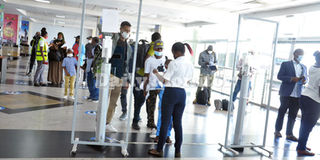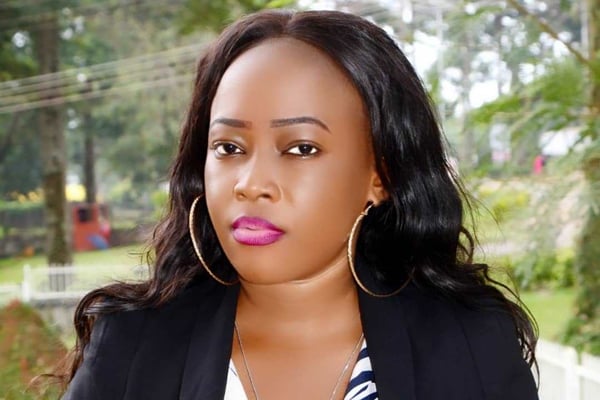Prime
Government allows incoming passengers to go home after testing

Incoming passengers check their body temperature on arrival at Entebbe International Airport. Photo | Eve Muganga
What you need to know:
- This was confirmed by Dr Atek Kagirita, the Ministry of Health’s COVID-19 Deputy Incident Commander while addressing Members of the Parliamentary Committee on Health at Entebbe International Airport on Thursday.
The government through the Ministry of Health has allowed incoming passengers at Entebbe International Airport to proceed to their homes or hotels for self-isolation after testing for covid19.
This was confirmed by Dr Atek Kagirita, the Ministry of Health’s COVID-19 Deputy Incident Commander while addressing Members of the Parliamentary Committee on Health at Entebbe International Airport on Thursday.
“This arrangement starts on Friday, November 5, 2021,” he said, adding: “Out of 11,449 passengers tested since the commencement of mandatory testing for all incoming passengers, only 43 tested positive.”
Previously, incoming passengers would wait for their results for a period of about two and half hours before being allowed to proceed to their areas of residence.
The Uganda Civil Aviation Authority’s Director-General, Mr Fred Bamwesigye, applauded the move to allow arriving passengers to leave the airport after the sample is picked from them.
“This decision will go a long way in minimizing passenger processing time through the airport, and subsequently the bulk of complaints, which were mainly arising from the time spent waiting at the airport,” he said.
After going through the process flow and inspecting the facilities, including the government testing laboratory and waiting area, the Committee’s Vice Chairman, Mr Joel Ssebikaali, said: “It was even more dangerous for them to wait in big numbers in a congested facility.”
However, some of the members, including the Mbarara Woman MP, Hon. Margret Ayebare Rwebyambu expressed worry about the danger of letting passengers whose status is not yet known into the community citing challenges with tracing them.
“Before joining Parliament, I used to work with people affected with HIV, but one of the major challenges was to follow up the positives to ensure that they take their medicine to improve their health. How about those whose sample is to be picked and do not know that they are positive, but are going to be allowed to mingle with the public!” she wondered.





